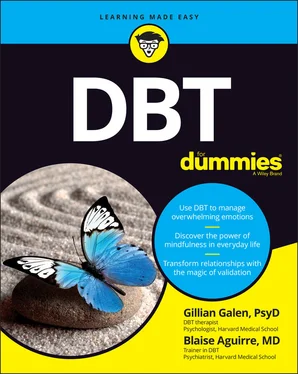Breaking free of rigid choices
People who have conditions like BPD often have the experience of black-and-white thinking or make rigid all-or-nothing decisions. For some people, this way of living can lead to a pattern of recurring automatic negative thoughts that become increasingly destructive. So, a thought like “I can’t do anything right” can become “I am worthless” and then “I shouldn’t be alive.” The following sections help you break free of rigid thinking.
Moving from either/or to both/and
In DBT the key is to move away from a polarized position to a synthesized position, meaning that the truth in each position is acknowledged. The synthesis comes from what Dr. Marsha Linehan, who developed DBT, described as the recognition of truth in seemingly opposing positions, which she termed thesis and antithesis. Take the earlier example:
Thesis: “Because I make a lot of mistakes, I can’t do anything right, I am worthless, and so I shouldn’t be alive.”
Antithesis: “Making mistakes is not a big deal. Everyone makes mistakes. I shouldn’t really care about making mistakes.”
These are either/or types of statements. The first one is extreme and filled with all-or-nothing type thinking, and the second one invalidates the truth about what a person might actually be feeling.
Dialectical synthesis is the integration of a thesis and its antithesis in a way that acknowledges that change is the only constant in the universe and that it’s an enduring process. It further recognizes that all things are made of opposing forces, and particular to the context of DBT, dialectical synthesis integrates the most essential and core parts of two polarities in order to form a new meaning, a new understanding, or a new solution in a given situation.
Dialectical synthesis isn’t compromise. Whereas compromise is typically an agreement that is reached by each side making concessions, in dialectical synthesis, the agreement is reached by each side integrating the wisdom of the other side’s perspective, an understanding derived from genuine curiosity. The following is the dialectical synthesis of the preceding thesis and antithesis:
Dialectical synthesis:“It is true that I make mistakes, and also that others make mistakes. It is true that when I have such an experience, I think that I am worthless and that I should not be alive, and it is also true that everyone who is alive has made mistakes and they are not worthless. So, by acknowledging that I make mistakes and committing to learn and improve on the situations that lead me to make mistakes, I become a more skilled person, and the mistakes that I have made do not diminish my value and worth as a person.”
Choosing instead of reacting
 Many of our responses to events are reactions rather than choices. The problem is that these reactions aren’t always the best course of action. The consequences of these reactions may be that they keep people stuck in misery or even worsen the situation, including adversely impacting the quality of relationships.
Many of our responses to events are reactions rather than choices. The problem is that these reactions aren’t always the best course of action. The consequences of these reactions may be that they keep people stuck in misery or even worsen the situation, including adversely impacting the quality of relationships.
We often react without thinking. This is most likely an evolutionary response. If a snake were to cross our path, we wouldn’t want to stop and ponder the nature of the snake and wonder whether it was poisonous. In many situations it actually makes sense to just react. However, if our responses are based simply on our fears and insecurities, then those responses are often not in our long-term interests.
Choosing, on the other hand, is taking all the elements of a situation into consideration before then deciding on the best course of action. This includes integrating values, long-term goals, emotions, current circumstances, and so on.
A more concrete example is that your best friend goes to a party and doesn’t mention to you that she is going. You immediately react by angrily calling her. Now both of you are upset. You have worsened the relationship, which is likely inconsistent with your values and relational goals.
If instead you choose your response, you’ll notice your anger reaction. You can then use the STOP skill (see Chapter 11), which essentially asks you to pause, take a breath, and reflect on the situation. Do you know all that was going on with your friend? Do you know her intentions? Was it her goal to reject or disregard you? Does it help you to dwell on what happened? The choice might then be to call her and say that you were feeling hurt about not having been told about it, or to let her know that you were confused. Or you may even just let it go, knowing that your best friend may have had a good reason for not having invited you, and that she cares deeply about you.
 The DBT practice of mindfulness (see Chapter 9) is key to the practice of choosing. This is because it entails noticing our reactions to the things that happen in our lives. The task is then to pause without an immediate reaction. The fact that we have an internal reaction doesn’t mean that we have to respond to it. We can notice the urge without acting on it. And then, on noticing it, we can decide that in fact it was the wise choice or that it was not, or that we can simply notice the urge. Choice is sometimes the choice to not do anything at all.
The DBT practice of mindfulness (see Chapter 9) is key to the practice of choosing. This is because it entails noticing our reactions to the things that happen in our lives. The task is then to pause without an immediate reaction. The fact that we have an internal reaction doesn’t mean that we have to respond to it. We can notice the urge without acting on it. And then, on noticing it, we can decide that in fact it was the wise choice or that it was not, or that we can simply notice the urge. Choice is sometimes the choice to not do anything at all.
After the pause, pay attention to the reaction urge. You’ll notice that it passes. Everything always passes. It is the nature of impermanence that it will pass. Eventually it will go away altogether. Think about all the urges that you have ever had in the past. Where are they now? They have all passed. Once the urge has passed, the task is to consider what the wise and — if dealing with another person — compassionate response would be. Ask yourself: “What response will help my relationship?” and “What response will help me stick to my values and reach my long-term goals?”
 The practice of choosing rather than reacting takes time, because it requires the observation of the reaction urge without actually reacting. The best way to do this is to set an intention and then practice with little urges to get the feel of the practice before tackling bigger urges.
The practice of choosing rather than reacting takes time, because it requires the observation of the reaction urge without actually reacting. The best way to do this is to set an intention and then practice with little urges to get the feel of the practice before tackling bigger urges.
Transforming Negatives into Positives
DBT often uses metaphors to teach. One type of metaphor is known as a short, which is similar to a parable, a short story that illustrates a point. One that we use is the story of the farmer and his horses, which goes like this:
An old farmer had worked his crops for many years. He was considered wealthy by his neighbors as he had ten horses. One day, during a terrible storm, his horses ran away. Upon hearing the news, his neighbors came by to commiserate: “What bad luck you’ve had,” they said sympathetically. “Maybe,” replied the farmer.
The next morning, the horses, hungry from being out in the wild, returned and brought with them ten wild horses. “How wonderful! You are a rich man!” the neighbors exclaimed. “Maybe,” replied the farmer.
The following day, his son tried to tame one of the wild stallions. The horse bucked the boy off and he broke his leg. The neighbors again came to offer their sympathy. “Your son won’t be able to help you in the fields. What bad luck!” they said. “Maybe,” said the farmer.
The next day some military officials came to the village looking to draft young men into the army as they prepared for war. On seeing that the son’s leg was broken, they passed him by. The neighbors again came out and congratulated the farmer on how well his circumstances had turned out. “Maybe,” said the farmer.
Читать дальше

 Many of our responses to events are reactions rather than choices. The problem is that these reactions aren’t always the best course of action. The consequences of these reactions may be that they keep people stuck in misery or even worsen the situation, including adversely impacting the quality of relationships.
Many of our responses to events are reactions rather than choices. The problem is that these reactions aren’t always the best course of action. The consequences of these reactions may be that they keep people stuck in misery or even worsen the situation, including adversely impacting the quality of relationships. The DBT practice of mindfulness (see Chapter 9) is key to the practice of choosing. This is because it entails noticing our reactions to the things that happen in our lives. The task is then to pause without an immediate reaction. The fact that we have an internal reaction doesn’t mean that we have to respond to it. We can notice the urge without acting on it. And then, on noticing it, we can decide that in fact it was the wise choice or that it was not, or that we can simply notice the urge. Choice is sometimes the choice to not do anything at all.
The DBT practice of mindfulness (see Chapter 9) is key to the practice of choosing. This is because it entails noticing our reactions to the things that happen in our lives. The task is then to pause without an immediate reaction. The fact that we have an internal reaction doesn’t mean that we have to respond to it. We can notice the urge without acting on it. And then, on noticing it, we can decide that in fact it was the wise choice or that it was not, or that we can simply notice the urge. Choice is sometimes the choice to not do anything at all. The practice of choosing rather than reacting takes time, because it requires the observation of the reaction urge without actually reacting. The best way to do this is to set an intention and then practice with little urges to get the feel of the practice before tackling bigger urges.
The practice of choosing rather than reacting takes time, because it requires the observation of the reaction urge without actually reacting. The best way to do this is to set an intention and then practice with little urges to get the feel of the practice before tackling bigger urges.










